Greta Thunberg is a passionate climate change activist who started protesting outside Swedish Parliament in 2018, inspiring millions of youth globally with her fearless speeches and peaceful strikes. She formed Fridays for Future, a movement that challenges leaders to take urgent action on the climate crisis. Her powerful speeches, protests, and advocacy emphasize justice, science-based policies, and immediate change. Keep exploring to find out how her actions are shaping the future of climate activism.
Key Takeaways
- Greta Thunberg is a Swedish climate activist who started her movement by protesting outside Parliament in 2018.
- She organized the global youth movement Fridays for Future, inspiring millions of students worldwide.
- Greta delivers powerful speeches at major events, emphasizing urgent climate action and accountability.
- Her activism includes civil disobedience, protests, and legal challenges to demand stronger climate policies.
- Thunberg advocates for immediate emissions reductions, climate justice, and renewable energy solutions to combat global warming.
Early Beginnings and Formation of Fridays for Future
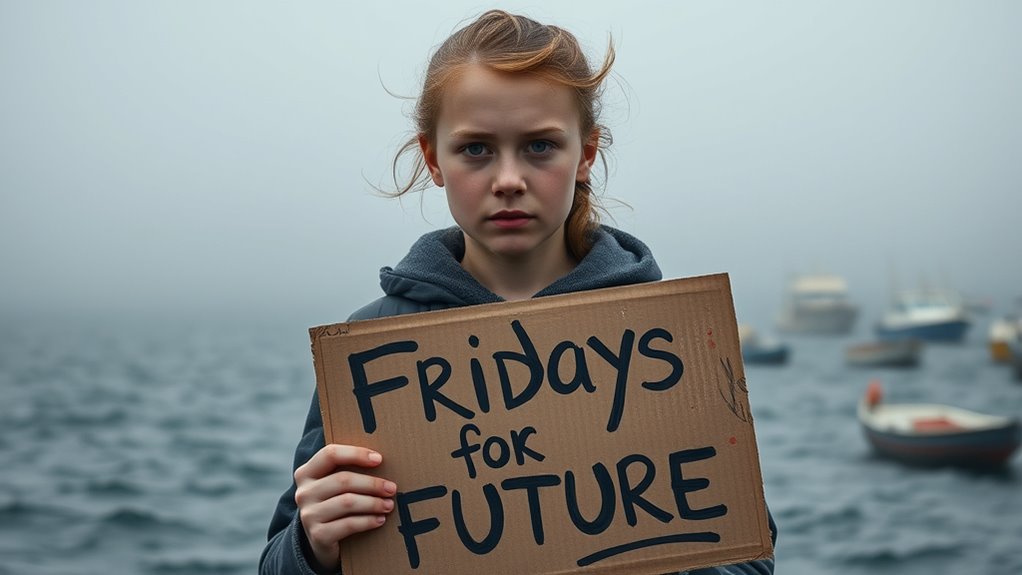
Have you ever wondered how a single school strike could ignite a global movement? On August 20, 2018, a 15-year-old Swedish girl named Greta Thunberg skipped school and protested outside the Swedish Parliament. Her protest coincided with the new school semester and the Swedish election campaign. She planned to strike for three weeks, demanding stronger climate action aligned with the Paris Agreement. Greta boycotted classes to push for real change from her government. Unexpected media coverage and social media sharing quickly expanded her message beyond Sweden. Within months, her small protest inspired thousands of young people worldwide. The movement grew into weekly strikes, emphasizing youth activism and peaceful protest. Greta’s clear voice and determination made her the symbol of a global youth-led climate movement. Her activism also coincided with a global shift in climate discourse, which helped amplify her message further. Additionally, her efforts highlighted the importance of public awareness and inspired other youth to participate in climate advocacy.
Global Impact and Major Speeches
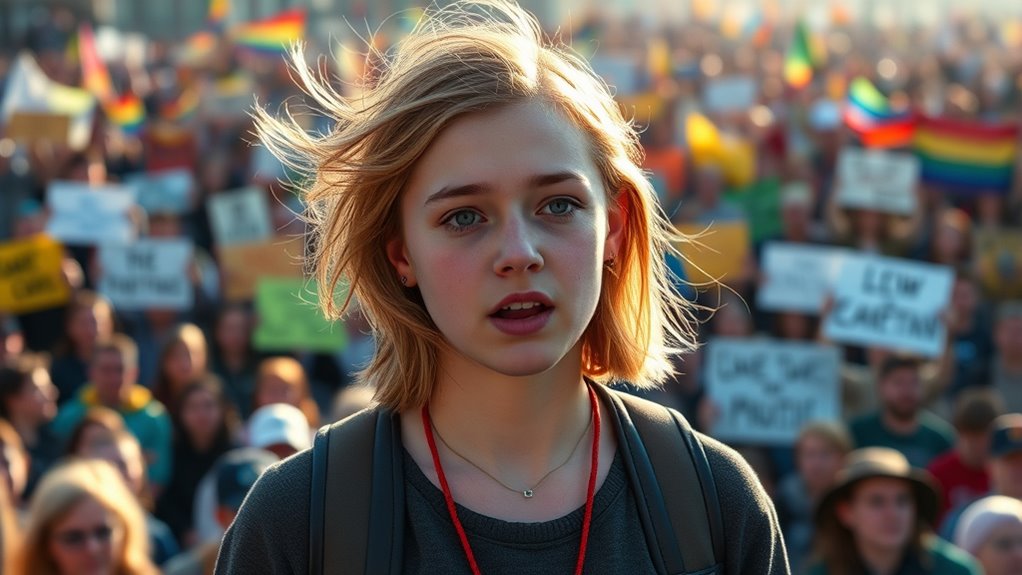
Greta Thunberg’s speeches have galvanized global attention, transforming her from a lone school striker into a powerful voice demanding urgent climate action. You recognize her influence through key moments like the 2019 UN Climate Summit, where she warned leaders that young people are “watching” and criticized their focus on money over solutions. Her European and British Parliament speeches condemned political complacency and emphasized climate change as an existential crisis. During the December 2018 TED Talk, she highlighted alarming extinction rates and called for immediate emissions cuts. At the September 2019 climate strike, she framed the crisis as a tipping point, mobilizing youth worldwide. Her impactful messages consistently demand accountability, emphasizing that inaction borders on betrayal of future generations. Science has been clear for over 30 years about climate risks, and her speeches underscore the urgency of translating scientific evidence into decisive policy actions. Recognizing the importance of scientific consensus, her words aim to bridge the gap between research and policy to drive meaningful change.
Protest Strategies and Legal Challenges
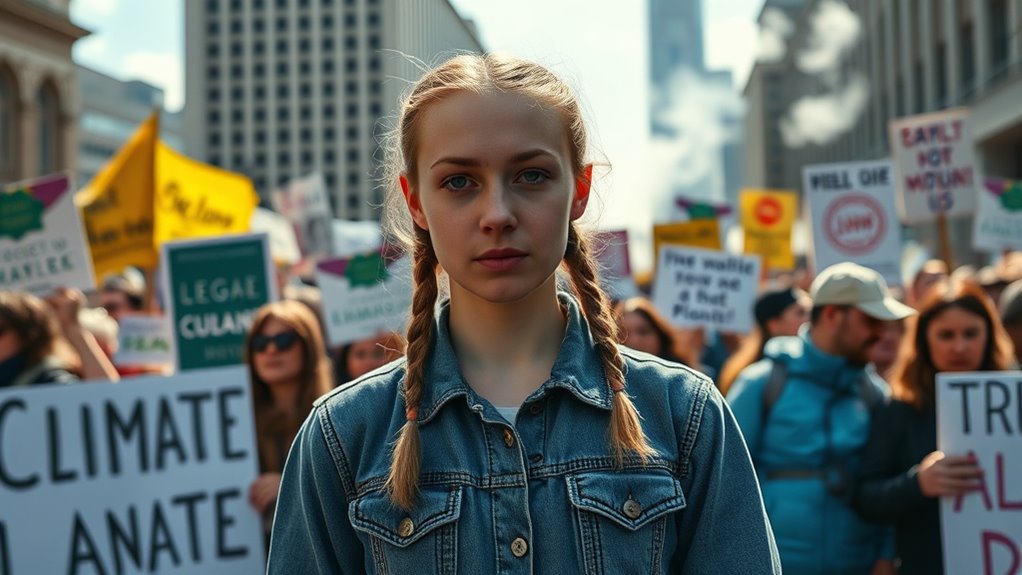
Greta Thunberg’s relentless activism often involves bold protest strategies that challenge existing legal boundaries. You might find her blocking entrances to government buildings or oil conferences, deliberately refusing police orders to highlight climate urgency. These civil disobedience actions often lead to fines or arrests but serve to disrupt normal operations and draw media attention. Thunberg’s protests, like school strikes through the “Fridays for Future” movement, use symbolic acts to push for change. Legal challenges frequently follow, such as her acquittal in London for protesting without lawful orders or fines in Sweden for blocking Parliament. These actions test the limits of lawful protest, emphasizing the tension between activism and legal restrictions. Incorporating mindful decluttering strategies into activism could help activists manage emotional stress and stay focused on their goals. Despite penalties, her efforts boost awareness and provoke ongoing legal debates around climate activism.
Inspiring Youth and Mobilizing Worldwide
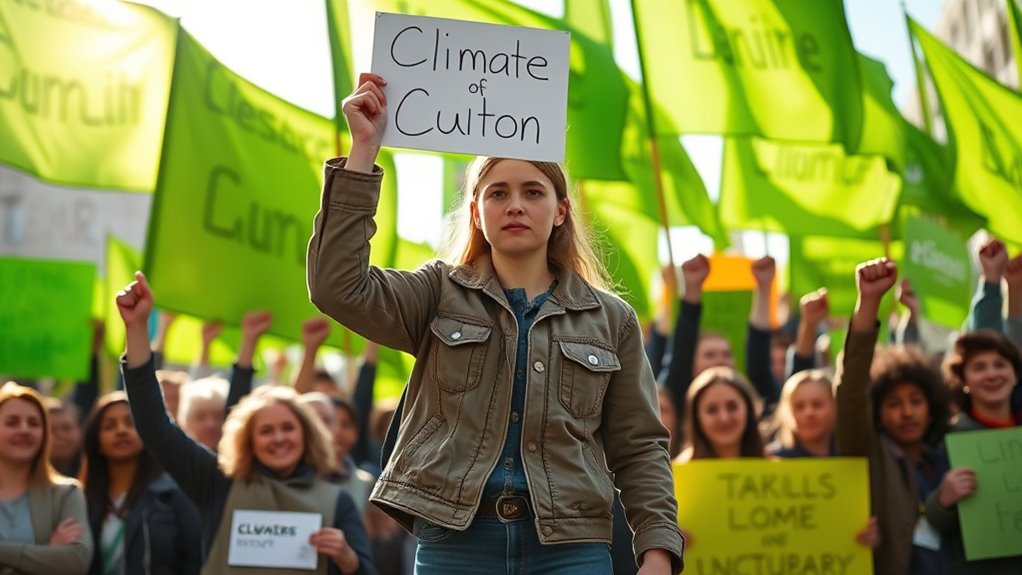
You’ve likely seen how Greta Thunberg sparked a global youth movement with her school strikes and powerful speeches. Her strategies for mobilization, like social media and direct appeals to leaders, have energized millions of young people worldwide. By inspiring youth to act, she’s shown that collective effort can challenge even the biggest climate issues. Her activism has led to massive protests involving over a million students across the globe, demonstrating the power of organized youth action. Additionally, her emphasis on craft and textiles as means of self-expression has inspired many young activists to incorporate sustainability into their creative pursuits.
Global Youth Engagement
The global youth movement for climate action has gained remarkable momentum, inspiring millions of students across continents to participate in coordinated protests and advocacy efforts. You see, students from the U.S., Africa, Asia, and beyond join climate walkouts, often with support from schools allowing excused absences. Platforms like Fridays For Future connect youth worldwide, keeping engagement alive through social media and local groups. Your participation reflects a diverse mix of socioeconomic and cultural backgrounds, emphasizing environmental justice. Youth activism is strengthened by role models like Thunberg, who exemplify lifestyle commitments and challenge leaders directly. This movement:
- Mobilizes youth across borders with digital tools
- Promotes environmental education and awareness
- Empowers young people through leadership opportunities
- Unprecedented Environmental Activism has propelled the movement forward, with more students recognizing the importance of climate action in their future.
You are part of a global wave shaping climate policies and inspiring change.
Impactful Public Speeches
Public speeches by Greta Thunberg have become powerful tools for inspiring youth and mobilizing global action on climate change. When you hear her at the UN Climate Summit, her fierce words, like “How dare you!”, cut through political complacency. She uses strong rhetoric to hold leaders accountable, accusing them of stealing dreams and ignoring scientific facts. Greta references IPCC reports and carbon budgets, emphasizing the urgency of immediate, drastic emission cuts—warning that our window to act is closing fast. Her speeches blend emotional appeals with scientific data, framing hope as truth-telling and action, not empty optimism. Through personal stories and moral outrage, she energizes young people worldwide to demand change, turning speeches into rallying cries that challenge societal complacency and spark worldwide activism. Scientific data and statistics show emissions still rising despite promises, reinforcing her message that urgent systemic change is necessary to avoid irreversible damage. Recognizing the importance of sustainable practices, she advocates for transformative policies that address the root causes of climate crises and promote long-term resilience.
Mobilization Strategies
Greta Thunberg’s launch of Fridays for Future in 2018 transformed individual climate concerns into a powerful global youth movement. You’re part of a movement that empowers students to skip school on Fridays, demanding urgent climate action. The movement builds on shared frustration and urgency, mobilizing youth worldwide through grassroots activism and digital platforms. Its success lies in:
- Using powerful imagery and metaphors to cut through political inertia
- Reversing roles to shame adults for failing future generations
- Employing blunt, emotionally charged language to resonate
Thunberg’s age and relatable image foster a sense of shared identity, making it easier for you to participate. Localized strikes provide accessible opportunities, encouraging peer participation and creating contagion effects. This structure maximizes engagement and amplifies youth voices globally. Research shows that these strategies effectively challenge societal norms and inspire widespread climate activism, often leveraging youth empowerment to catalyze change.
Core Messages and Advocacy Goals
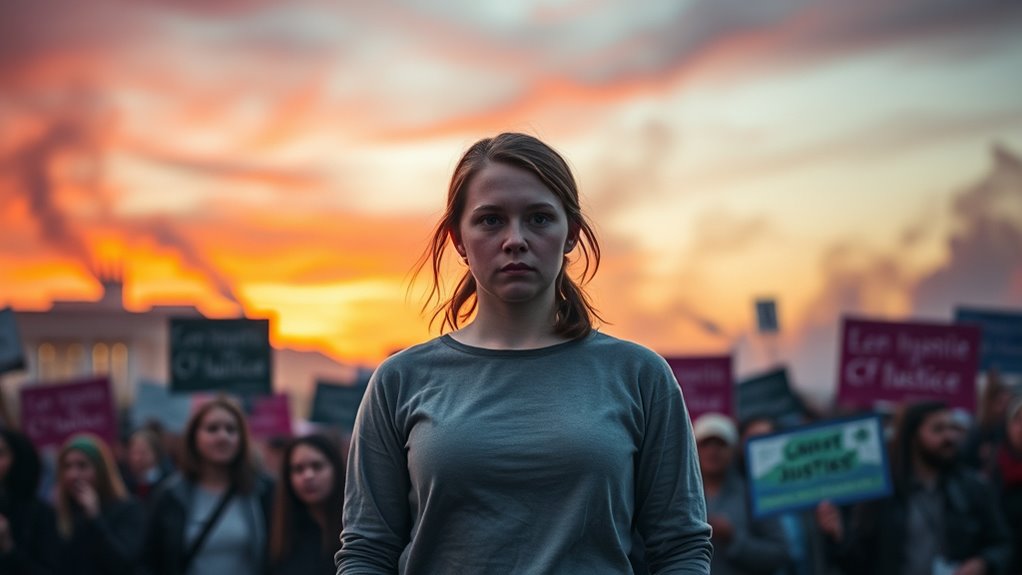
Greta Thunberg emphasizes that urgent climate action is essential now, not in the distant future, and criticizes political leaders for delaying meaningful steps. She highlights the importance of justice and equity, calling for accountability from governments and corporations for ecological harm. Her core message is clear: we must act decisively to protect vulnerable populations and ensure a sustainable future for all. She has repeatedly pointed out that many leaders are “not mature enough to tell it like it is” and that their inaction is “failing us,” which further underscores the urgency for immediate change. Recognizing that creative practice can foster innovative approaches to environmental challenges, Thunberg advocates for integrating creative solutions into climate activism to inspire broader engagement.
Urgency of Climate Action
Why do we need to act now? Because climate change isn’t waiting. Scientific reports show that current commitments, like the Paris Agreement, are far from enough to limit warming to 1.5°C. Emissions must drop sharply immediately, not decades from now. Thunberg criticizes vague promises like net zero by 2050, insisting we need real, annual cuts today. Ignoring urgent action risks irreversible damage and betrays future generations. Nature’s laws don’t negotiate—delays only worsen the crisis. Climate models predict that delays will make it impossible to stay within safe temperature limits. Moreover, the increasing reliance on automation and AI in various sectors underscores the need for swift action to prevent further environmental degradation. Remember, you must demand: – Immediate, steep reductions in greenhouse gases – Honest leadership that prioritizes science over politics – Systemic change, not just superficial policies The time to act is now—climate stability depends on it.
Justice and Equity Focus
Addressing the climate crisis requires more than just reducing emissions; it demands justice and fairness for those most affected. You must see climate change as a human rights issue, holding governments and corporations accountable for ecological harm and social inequality. Wealthier nations should cut emissions faster, reflecting their historic contributions, and support developing countries with finance and technology. You’re encouraged to amplify youth and marginalized voices, recognizing their leadership and moral stake in future generations. Genuine progress needs binding laws, not misleading promises or greenwashing. Climate justice links environmental health with social justice, emphasizing that vulnerable communities—indigenous peoples, the poor, and marginalized groups—must be prioritized. Only through equitable policies can we ensure a fair, sustainable future for all. Recognizing the importance of youth-led activism, it is vital to empower young activists like Greta Thunberg, whose leadership demonstrates the power of moral clarity and collective action. Additionally, fostering Climate justice ensures that the voices of those most impacted are central to decision-making processes.
Recognitions and Broader Influence

Her impactful activism has earned her numerous prestigious awards, reflecting global recognition of her efforts to combat climate change and promote human rights. These honors highlight her influence beyond protests, showing how she inspires systemic change. You see, her awards include the 2019 Right Livelihood Award, Amnesty International’s Ambassador of Conscience Award, and the NEA Friend of Education Award. She was also nominated for the Nobel Peace Prize in 2019 for emphasizing climate change’s role in global conflict. Her leadership sparked the Fridays for Future movement, mobilizing millions worldwide. You can also observe how she:
- Challenges world leaders publicly, demanding accountability.
- Elevates climate science in political debates.
- Inspires other activists and organizations to adopt assertive tactics.
Her recognition underscores her broad impact on global climate discourse. Additionally, her advocacy often emphasizes the importance of renewable energy sources as a sustainable solution to environmental challenges.
Her awards and nominations further solidify her status as a leading voice in environmental activism.
Continuing the Fight for Climate Justice
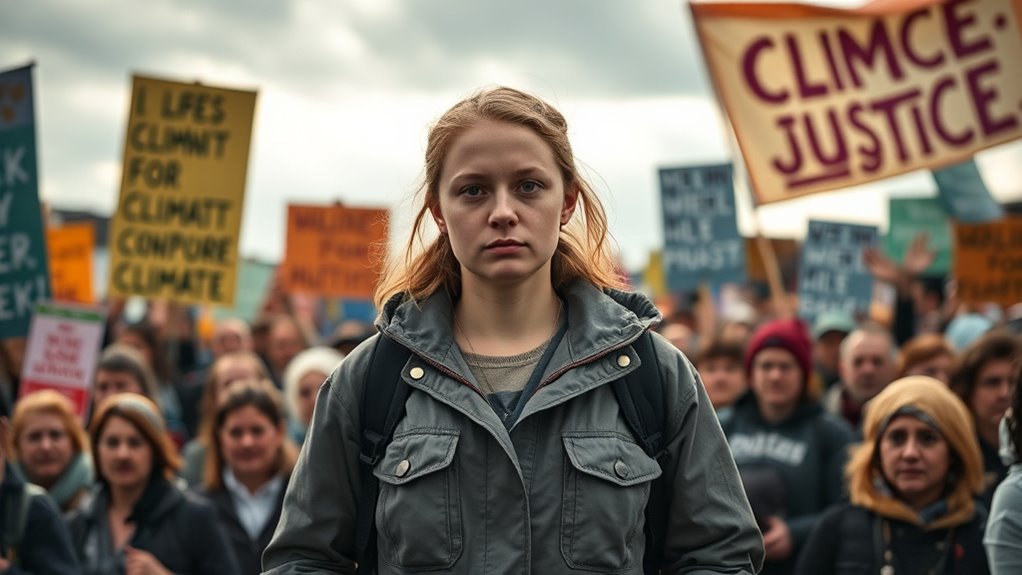
Greta Thunberg’s influence has propelled the ongoing fight for climate justice into a global movement that demands urgent action. You recognize that humanity faces an existential crisis, especially for younger generations whose futures are at risk. Despite minimal emissions, people in the Global South suffer the most from climate impacts, emphasizing the need for zero-emission goals rather than just reductions. Climate justice is intertwined with social justice, addressing human rights and environmental destruction caused by oppression and war. Movements like Fridays For Future, led by youth worldwide, continue to mobilize through strikes and social media to pressure governments. Greta’s unwavering advocacy holds leaders accountable, insists on science-based policies, and links ecological crises with moral responsibility—driving a collective push for real change.
Frequently Asked Questions
What Personal Challenges Has Greta Thunberg Faced During Her Activism?
You face personal challenges like emotional struggles from learning about climate change early on, which caused sadness and even temporary mutism. Your Asperger’s helps you stay focused and determined, but it also presents social difficulties. Public criticism, media scrutiny, and misunderstandings about your lifestyle changes add pressure. Despite these hurdles, your unwavering commitment and clarity drive your activism, turning personal obstacles into sources of strength and motivation.
How Does Greta Thunberg Collaborate With Other Environmental Organizations?
Think of her collaboration as a web connecting many crucial strands. You see, she partners with global organizations like WHO, IOM, and Stop Ecocide Foundation, channeling funds and support to frontline climate justice projects. You’ll notice she uses her platform and the Greta Thunberg Foundation to amplify these efforts, ensuring her allies’ work reaches wider audiences. Together, they build a powerful network fighting for climate action and ecological preservation worldwide.
What Are Greta Thunberg’S Views on Technological Solutions to Climate Change?
You might wonder about her stance on technological solutions for climate change. She believes these are useful but not enough alone. She urges stopping emissions entirely, not just lowering them, and emphasizes systemic societal changes. While she sees digital tools like remote work as helpful for reducing emissions, she warns that technology must be paired with policy shifts and social justice efforts. Ultimately, she advocates for a holistic approach that includes education and political action.
How Does Thunberg Address Criticism and Misinformation About Her Activism?
Imagine battling a storm with an unyielding shield—that’s how she handles criticism and misinformation. She ignores personal insults and stays focused on facts, citing scientific reports like the IPCC to counter false claims. When critics question her motives, she redirects attention to global leaders’ failures. Using powerful speeches and social media, she amplifies the truth, making her voice a resilient shield against misinformation and a call for urgent climate action.
What Are Greta Thunberg’S Future Plans for Climate Advocacy?
You’re curious about future climate advocacy plans. You’ll see efforts expand to include social justice issues, legal actions like recognizing ecocide, and global mobilizations. Expect increased youth empowerment, public awareness campaigns, and international cooperation. You’ll work with organizations, influence policies, and support humanitarian efforts to address systemic issues. Your goal is to push for stronger legal frameworks, more climate strikes, and lasting change to safeguard the environment for future generations.
Conclusion
You’ve seen how Greta Thunberg’s passion sparks a global movement like a wildfire spreading through dry woods. Her unwavering voice and bold actions inspire millions to stand up for climate justice. Just as a single spark can ignite a forest, her determination fuels hope and change worldwide. Keep listening, learning, and acting—because together, you can turn the tide and build a healthier planet for future generations.










